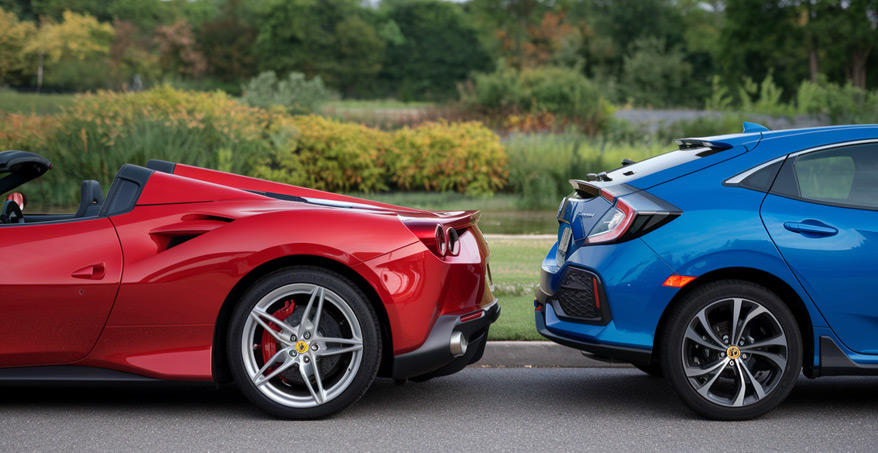Luxury or economy? Discover the key differences and choose the best option for your lifestyle.
Choosing between a luxury car and an economy car can feel like a tough decision. On one hand, luxury cars offer premium comfort, cutting-edge technology, and a driving experience like no other. On the other, economy cars are budget-friendly, practical, and efficient.
So, which is the better choice for you? It all depends on your lifestyle, budget, and priorities. Let’s break down the key factors to help you make an informed decision.
1. Price & Affordability
The most obvious difference between luxury and economy cars is the price tag. Luxury cars can cost anywhere from $50,000 to well over six figures, depending on the brand and model. Premium vehicles from brands like Mercedes-Benz, BMW, and Audi come with advanced features and high-quality materials, but that level of sophistication comes at a cost—not just in terms of the purchase price, but also in maintenance and insurance.
On the other hand, economy cars are significantly more affordable. Brands like Toyota, Honda, and Hyundai offer a wide range of models starting around $20,000, with low ownership costs. These vehicles are designed to be practical and reliable, making them ideal for budget-conscious buyers. Plus, economy cars often come with impressive fuel efficiency, saving you money at the pump.
Which to choose? If you’re looking to keep your expenses low and need a dependable daily driver, an economy car makes the most sense. But if your budget allows and you want the finest driving experience, a luxury car might be worth the investment.
2. Features & Technology
Luxury cars are known for offering cutting-edge technology and features that are often ahead of their time. Expect things like adaptive cruise control, surround-view cameras, advanced safety features, and high-end infotainment systems. The interior materials are typically more refined, with leather seats, customizable ambient lighting, and wood or metal accents.
Economy cars, while simpler, aren’t lacking in modern conveniences. Many models today come equipped with tech features like touchscreens, Bluetooth, Apple CarPlay, and advanced driver assistance systems such as lane departure warnings and automatic emergency braking. While you may not get the plush interiors or the same level of tech as a luxury car, economy cars still offer solid value in terms of standard equipment.
Which to choose? If you enjoy the latest gadgets and a high-tech driving experience, a luxury car will deliver on those fronts. For practical drivers who don’t need every bell and whistle, an economy car will still provide essential technology.
3. Driving Experience
Luxury cars are renowned for offering a smoother, quieter ride with enhanced performance capabilities. Brands like Lexus, BMW, and Tesla are designed with powerful engines, adaptive suspensions, and sound-dampening interiors, making driving feel more like gliding down the road. The handling is precise, and acceleration is often faster than that of economy vehicles, especially with performance-focused luxury models.
Economy cars are more utilitarian in this regard. They prioritize efficiency over performance, with smaller engines and simpler suspension systems. However, models like the Honda Civic and Toyota Corolla are praised for offering a balanced, reliable driving experience. They may not have the same power or finesse, but they get the job done with dependable performance and great fuel economy.
Which to choose? If you value a premium driving experience with more power and refinement, luxury cars win this category. But for everyday commuting and cost-saving efficiency, an economy car offers everything most drivers need.
4. Long-Term Value & Depreciation
Luxury cars tend to depreciate faster than economy cars. The moment a luxury vehicle is driven off the lot, it can lose a significant percentage of its value. Five years down the line, a luxury car may be worth much less than a comparable economy car in terms of percentage retained.
Economy cars typically hold their value better over time, particularly because they have lower upfront costs and are in high demand in the used car market. A well-maintained Toyota or Honda can retain its value better than a premium BMW or Audi in the same timeframe.
Which to choose? For those looking to maximize long-term value, economy cars are a more financially sound choice. Luxury cars, while desirable, lose more of their initial value faster.
Final Thoughts: Which is the Better Choice?
At the end of the day, the decision between a luxury car and an economy car boils down to your personal preferences and financial situation. If you prioritize comfort, cutting-edge technology, and a superior driving experience—and you’re willing to pay for it—a luxury car will deliver. However, if you need a reliable, cost-effective vehicle for daily commuting and long-term value, an economy car is likely the smarter choice.
The key is to assess your needs and how much you’re willing to invest in your driving experience. Whether you choose to go with a budget-friendly model or indulge in the finer things, both options have their merits.
The question is: how much are you willing to pay for the ride?


